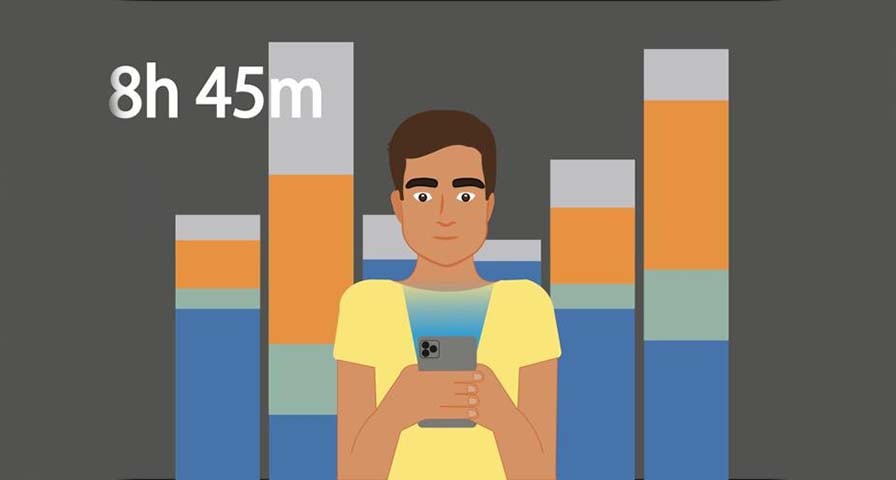Originally published July 25, 2020 in The Red and Black.
By Erin Kenney
Twitter. Instagram. TikTok. Facebook. Netflix. Zoom. YouTube. Snapchat. Hulu. Twitch. Spotify. Discord. Wash, rinse and repeat.
Since the onset of the COVID-19 pandemic in March, devices like smartphones, laptops and televisions have been a source of normalcy for many people. The ability to work remotely, stream a favorite television show or jump in a Zoom call with friends can make it seem like everything is normal, even though we’re living in an unprecedented time.
 A recent Parents Together survey of 3,000 parents found that for children, screen time has increased by 500% since the start of the pandemic. It makes sense, with schools, summer camps and sports leagues canceled. With online classes and telecommuting mandatory for some schools and workplaces, the increase of screen time for teenagers and adults might not be far behind.
A recent Parents Together survey of 3,000 parents found that for children, screen time has increased by 500% since the start of the pandemic. It makes sense, with schools, summer camps and sports leagues canceled. With online classes and telecommuting mandatory for some schools and workplaces, the increase of screen time for teenagers and adults might not be far behind.
Ethan Grizzle, a junior mechanical engineering student from Dahlonega, Georgia, said his screen time has increased since classes went online after spring break. He spent a lot of time in the spring semester doing classes online. He thinks his professors might have tried to compensate for the switch to online by increasing workload.
With devices like laptops and smartphones becoming lifelines in a pandemic, it’s important to know the impacts of increased screen time on health. Figuring out these impacts, however, may not be as simple as it seems, doctoral candidate Benjamin Boudreaux said.
Boudreaux studies how screen time impacts the 24-hour activity cycle in college students. In his research, he studies how screen time impacts sedentary behavior, physical activity and sleep schedule. All of these factors impact one another, he said. For example, exposure to screens alters the body’s circadian rhythm, which can lead to sleep problems, he said.
“It’s important to look at all of these components because this cycle is very dynamic, so it can fluctuate based on different behaviors, such as getting on a smartphone,” said Boudreaux.
Due to the many factors involved with the 24-hour cycle, it’s sometimes hard to determine if screen time is the culprit behind sleep problems, excessive sedentary behavior or even mental health problems, Boudreaux said. He said sometimes the impacts of screen time aren’t dependent on the amount of screen time, but instead how that screen time is spent.
Grizzle, who is taking an online class this summer, said he spends about four to five hours a day listening to lectures and doing homework. He also spends some time on social media and playing video games, he said.
There is an abundance of studies regarding how different types of screen time, such as social media and video games, impact health. A study from the Johns Hopkins Bloomberg School of Health found that adolescents who spend over three hours a day on social media are more likely to report internalizing behaviors, such as “social withdrawal” or “difficulty coping with anxiety and depression,” according to a news release about the study. On the other hand, a study published by the Pew Research Center found video games, social media and other online technology play a crucial role in helping teens create and maintain friendships.
Boudreaux said another reason it’s difficult to gauge whether or not screen time has an impact on mental health problems is the unpredictability of information online. On sites like Facebook, he said, a feed might consist of cute dog pictures and then something potentially upsetting, such as information (or opinions) about coronavirus. It’s hard for researchers to determine the impacts of screen time unless they can see what their subjects are doing on their phone, which creates privacy concerns, Boudreaux said.
While there is still lots of research to be done regarding how screen time impacts health problems, there are ways to manage screen time if it’s impacting physical or mental health.
Boudreaux said one way to limit screen time is by setting time limits for certain apps. Another way to decrease screen time is by lowering your amount of push notifications. These notifications often increase the urge to check your phone, he said. It’s also important to get at least 30 minutes of exercise a day, Boudreaux said.
“We’re not meant to be sitting down,” Boudreaux said. “Sitting is the new smoking.”
In addition to having physical health benefits, exercise can be stress-relieving and boost mental health, according to an article published by the American Psychological Association. Whatever the motive to exercise, however, it’s important to keep your body moving.
Seeking information about IHT's Online Physical Education program?




